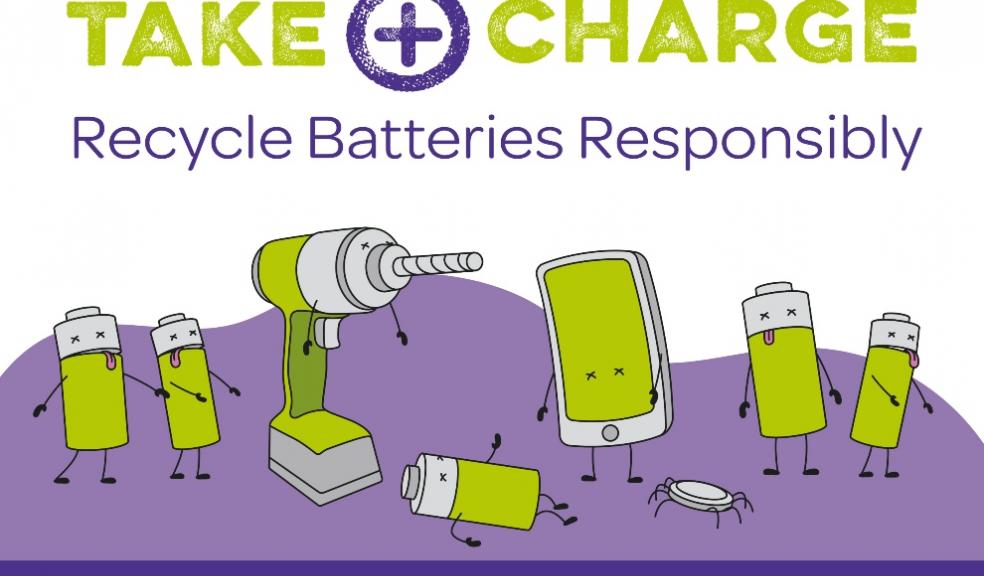
West Devon Borough Council joins national fight against "zombie batteries"
West Devon residents are being urged to “join the fight against Zombie batteries” in a bid to tackle waste collection fires caused by carelessly discarded dead batteries.
The Council’s waste and recycling partner FCC Environment supports the new national Take Charge campaign. It urges consumers to never throw batteries away alongside general rubbish, and to only recycle dead batteries using specialist battery recycling services.
Residents looking to dispose of dead domestic batteries in West Devon can put them into Box 2 alongside cardboard and clothes, take them to collection points or their local household waste recycling centre.
Dead batteries thrown away with other waste and recycling, which the campaign refers to as “zombie batteries”, are likely to be crushed or punctured once the waste is collected and processed. Some battery types in particular, like lithium-ion (Li-ion) and nickel-metal Hydride (NiMH), can ignite or even explode when they’re damaged. Once this happens, the batteries can quickly set fire to other materials present in the waste, like paper, leading to serious incidents that put lives at risk.
Although safe to use normally, powerful lithium-ion batteries are typically the most dangerous if they are not recycled properly. These batteries are often found in products like laptops, tablets, mobile phones, radio-controlled toys, Bluetooth devices, shavers, electric toothbrushes, power tools, scooters and even e-cigarettes.
The recycling and waste management trade body, the Environmental Services Association (ESA), which launched the campaign, conducts an annual survey of its members to record the proportion of fires occurring at recycling and waste facilities that are known or thought to have been started by lithium-ion batteries in particular.
Recent data collected by the ESA shows that, between April 2019 and March 2020, lithium-ion batteries alone were thought to be responsible for more than 250 fires at its members’ facilities during the year – or well over a third (38%) of all fires.
Members of the ESA hope that by encouraging the public to recycle batteries responsibly, it will reduce the number of “zombie batteries” present in general waste and recycling, thereby reducing the number of fires in future.
Cllr Mott/Jane Savage of WDBC said: “The Council fully supports this campaign as we have experienced a fire at our own depot leading to a load of paper having to be disposed of, rather than recycled. Batteries should be placed in a small clear tied bag, such as a sandwich bag or empty bread bag. Cover the contacts on lithium and button batteries with sticky tape to reduce fire risk.”
Commenting for FCC Environment, Julie Fourcade, Head of External Affairs, said: “We are pleased to support our local authority partners with the ESA campaign to help prevent waste and recycling fires caused by batteries that have not been disposed of properly. Everyone has a part to play in this important campaign to ensure both public safety and that of our staff working so hard to serve their communities.”
Executive Director of the Environmental Services Association (ESA), Jacob Hayler said: “Unfortunately, the majority of batteries thrown away in the UK at the moment are not recycled properly. Fires caused by carelessly discarded batteries endanger lives; cause millions of pounds of damage and disrupt waste services. We urge consumers to please recycle batteries responsibly by using widely available local battery recycling services.”
Take Charge is supported by the National Fire Chiefs Council (NFCC).
Mark Andrews, NFCC Waste Fires Lead and Assistant Chief Fire Officer of East Sussex Fire and Rescue Service, said: “Batteries in household waste and recycling can lead to large scale and protracted fires. These incidents are often very challenging for fire services to deal with and can cause significant disruption to communities. Many people may not realise the importance of the correct disposal of batteries so this simple advice can make a real difference in preventing waste fires.”
Consumers can find out more about the dangers of Zombie Batteries, by visiting the campaign website at www.takecharge.org.uk











